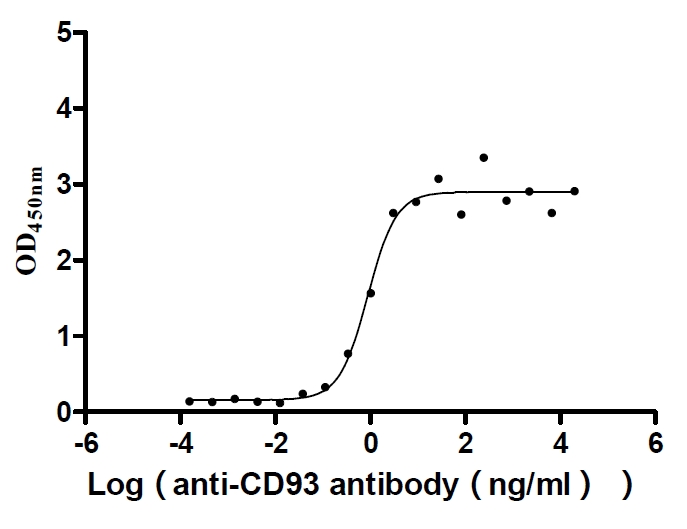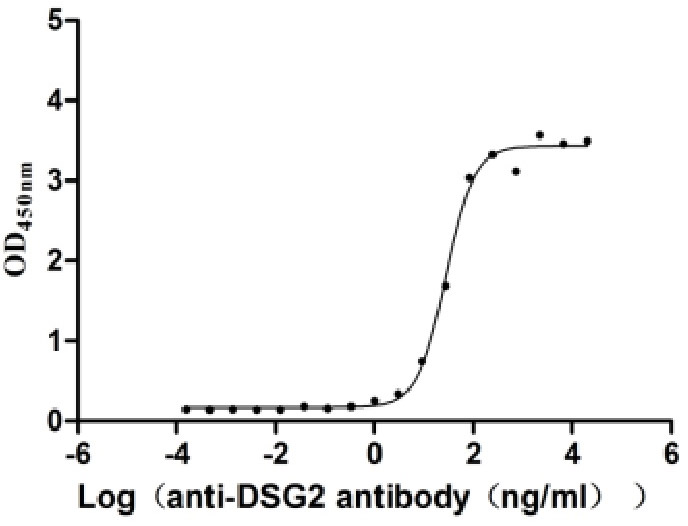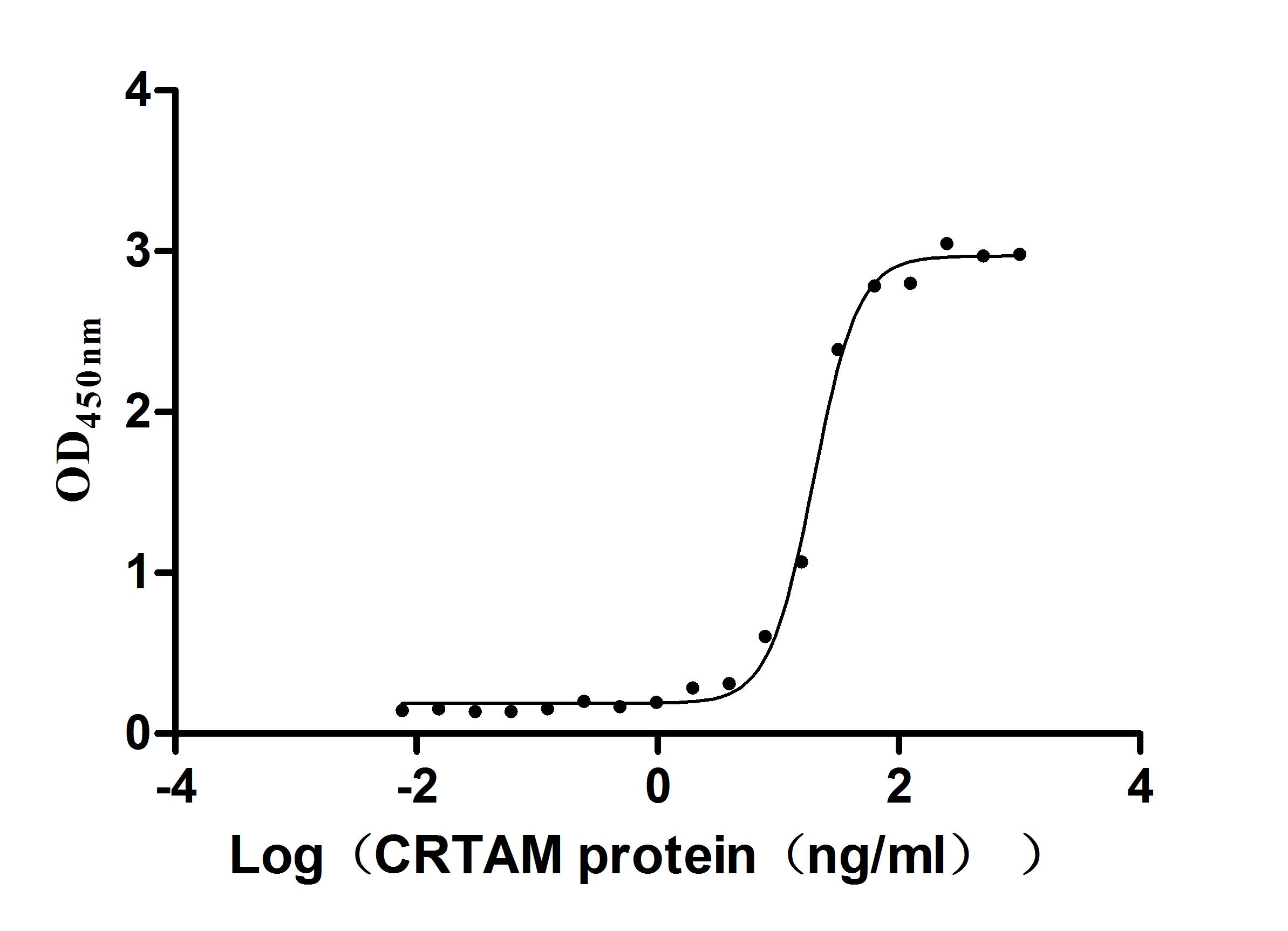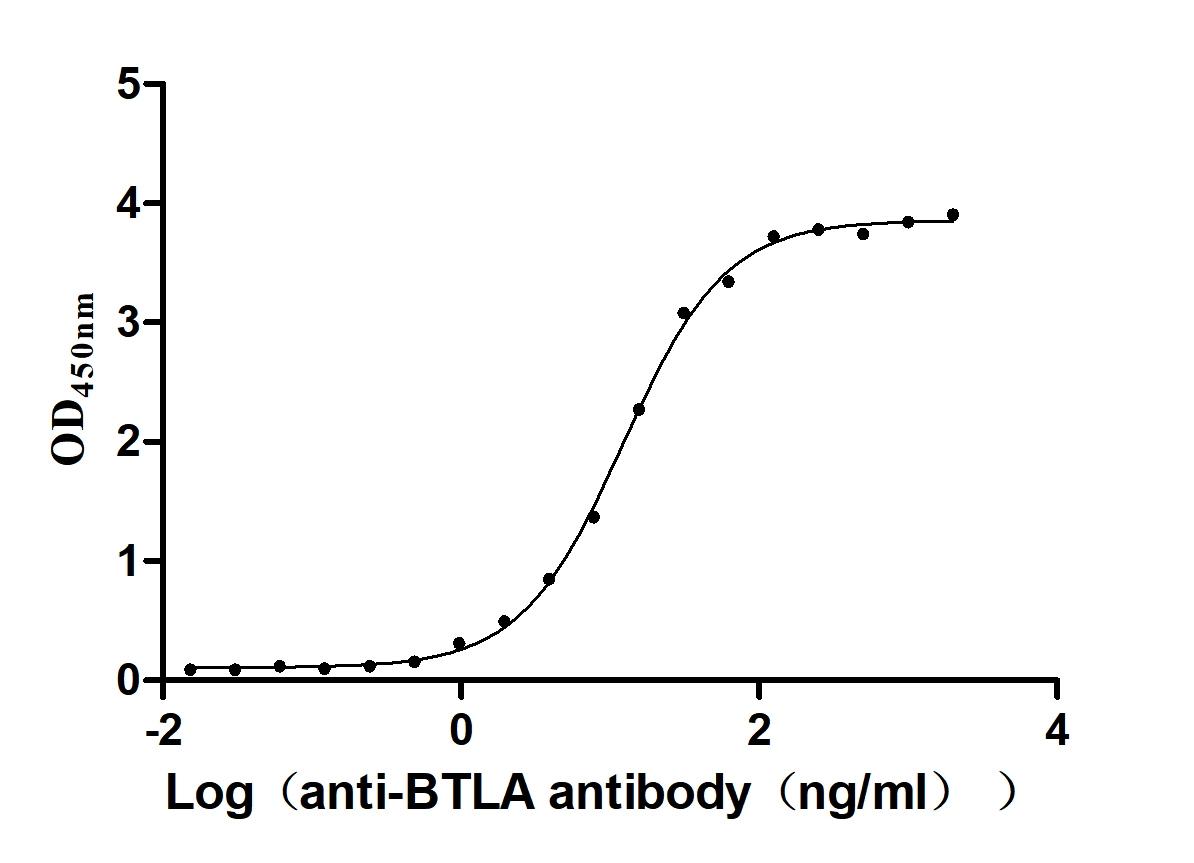Recombinant Human SH2B adapter protein 3 (SH2B3)
-
中文名称:人SH2B3重组蛋白
-
货号:CSB-YP892371HU
-
规格:
-
来源:Yeast
-
其他:
-
中文名称:人SH2B3重组蛋白
-
货号:CSB-EP892371HU
-
规格:
-
来源:E.coli
-
其他:
-
中文名称:人SH2B3重组蛋白
-
货号:CSB-EP892371HU-B
-
规格:
-
来源:E.coli
-
共轭:Avi-tag Biotinylated
E. coli biotin ligase (BirA) is highly specific in covalently attaching biotin to the 15 amino acid AviTag peptide. This recombinant protein was biotinylated in vivo by AviTag-BirA technology, which method is BriA catalyzes amide linkage between the biotin and the specific lysine of the AviTag.
-
其他:
-
中文名称:人SH2B3重组蛋白
-
货号:CSB-BP892371HU
-
规格:
-
来源:Baculovirus
-
其他:
-
中文名称:人SH2B3重组蛋白
-
货号:CSB-MP892371HU
-
规格:
-
来源:Mammalian cell
-
其他:
产品详情
-
纯度:>85% (SDS-PAGE)
-
基因名:
-
Uniprot No.:
-
别名:IDDM20; Lymphocyte adapter protein; Lymphocyte specific adapter protein; Lymphocyte specific adapter protein Lnk; Lymphocyte-specific adapter protein Lnk; SH2B adapter protein 3; SH2B adaptor protein 3; Sh2b3; SH2B3_HUMAN; Signal transduction protein Lnk
-
种属:Homo sapiens (Human)
-
蛋白长度:full length protein
-
表达区域:1-575
-
氨基酸序列MNGPALQPSS PSSAPSASPA AAPRGWSEFC ELHAVAAARE LARQYWLFAR EHPQHAPLRA ELVSLQFTDL FQRYFCREVR DGRAPGRDYR DTGRGPPAKA EASPEPGPGP AAPGLPKARS SEELAPPRPP GPCSFQHFRR SLRHIFRRRS AGELPAAHTA AAPGTPGEAA ETPARPGLAK KFLPWSLARE PPPEALKEAV LRYSLADEAS MDSGARWQRG RLALRRAPGP DGPDRVLELF DPPKSSRPKL QAACSSIQEV RWCTRLEMPD NLYTFVLKVK DRTDIIFEVG DEQQLNSWMA ELSECTGRGL ESTEAEMHIP SALEPSTSSS PRGSTDSLNQ GASPGGLLDP ACQKTDHFLS CYPWFHGPIS RVKAAQLVQL QGPDAHGVFL VRQSETRRGE YVLTFNFQGI AKHLRLSLTE RGQCRVQHLH FPSVVDMLHH FQRSPIPLEC GAACDVRLSS YVVVVSQPPG SCNTVLFPFS LPHWDSESLP HWGSELGLPH LSSSGCPRGL SPEGLPGRSS PPEQIFHLVP SPEELANSLQ HLEHEPVNRA RDSDYEMDSS SRSHLRAIDN QYTPL
-
蛋白标签:Tag type will be determined during the manufacturing process.
The tag type will be determined during production process. If you have specified tag type, please tell us and we will develop the specified tag preferentially. -
产品提供形式:Lyophilized powder
Note: We will preferentially ship the format that we have in stock, however, if you have any special requirement for the format, please remark your requirement when placing the order, we will prepare according to your demand. -
复溶:We recommend that this vial be briefly centrifuged prior to opening to bring the contents to the bottom. Please reconstitute protein in deionized sterile water to a concentration of 0.1-1.0 mg/mL.We recommend to add 5-50% of glycerol (final concentration) and aliquot for long-term storage at -20℃/-80℃. Our default final concentration of glycerol is 50%. Customers could use it as reference.
-
储存条件:Store at -20°C/-80°C upon receipt, aliquoting is necessary for mutiple use. Avoid repeated freeze-thaw cycles.
-
保质期:The shelf life is related to many factors, storage state, buffer ingredients, storage temperature and the stability of the protein itself.
Generally, the shelf life of liquid form is 6 months at -20°C/-80°C. The shelf life of lyophilized form is 12 months at -20°C/-80°C. -
货期:Delivery time may differ from different purchasing way or location, please kindly consult your local distributors for specific delivery time.Note: All of our proteins are default shipped with normal blue ice packs, if you request to ship with dry ice, please communicate with us in advance and extra fees will be charged.
-
注意事项:Repeated freezing and thawing is not recommended. Store working aliquots at 4°C for up to one week.
-
Datasheet :Please contact us to get it.
靶点详情
-
功能:Links T-cell receptor activation signal to phospholipase C-gamma-1, GRB2 and phosphatidylinositol 3-kinase.
-
基因功能参考文献:
- As a novel finding, our study suggests a role for KCNK5 in the regulation of platelet size and maturity. Furthermore, our findings confirm an association between the SH2B3-locus and platelet count. PMID: 28865245
- Single-nucleotide polymorphism in SH2B3 gene is associated with Hashimoto's thyroiditis. PMID: 28382505
- four selected single-nucleotide polymorphisms (SNPs) in the SH2B3 gene were genotyped in 158 patients with AIH, 327 patients with primary biliary cholangitis, 160 patients with autoimmune pancreatitis, and 325 healthy subjects of Japanese descent. Our findings suggest that an SNP and haplotype in SH2B3 are associated with Autoimmune hepatitis. PMID: 28703133
- In conclusion, germ line LNK mutations rarely occur in familial myeloproliferative neoplasms (MPNs) and do not segregate with the disease phenotype. The findings suggest that mutations in LNK, either germ line or acquired, may cooperate with acquired driver mutations in JAK2, CALR, or MPL to determine disease phenotype in MPNs. PMID: 27216218
- indicate that IL7RhighSH2B3low expression distinguishes a novel subset of high-risk B-acute lymphoblastic leukemia associated with Ikaros dysfunction PMID: 27322554
- Elevated expression of Lnk in polycystic ovary syndrome suggests that Lnk probably plays a role in the development of insulin resistance. PMID: 27459314
- Hypercholesterolemia acts in platelets and hematopoietic progenitors to exacerbate thrombosis and atherosclerosis associated with SH2B3 deficiency. PMID: 27430239
- The polymorphisms in LNK gene correlated to the clinical type of myeloproliferative neoplasms regardless of the JAK2 polymorphism. PMID: 27111338
- SH2B3 mutations occur infrequently, and exon 8 in SH2B3 may be the most frequent mutational area in BCR-ABL negative myeloproliferative neoplasms patients in Korea. PMID: 26522763
- LNK/SH2B3 is a key driver gene for human hypertension, and alteration of LNK in animal models has a profound effect on inflammation and hypertension. Thus, LNK is a potential therapeutic target for this disease and its devastating consequences. PMID: 26717315
- Meta-analysis of genome-wide association studies identifies common susceptibility polymorphisms for colorectal and endometrial cancer near SH2B3 and TSHZ1. PMID: 26621817
- results suggest that LNK suppresses IL-7R/JAK/STAT signaling to restrict pro-/pre-B progenitor expansion and leukemia development, providing a pathogenic mechanism and a potential therapeutic approach for B-ALLs with LNK mutations. PMID: 26974155
- the minor allele A of rs3184504 (A vs G, OR = 1.18, 95%CI = 1.12-1.24, P < 0.001) in SH2B3 significantly increased celiac disease susceptibility (Meta-Analysis) PMID: 26535636
- A number of mutations in LNK have been described in a variety of myeloproliferative neoplasms some of which have been demonstrated to cause increased cellular proliferation. PMID: 26660394
- The single-nucleotide polymorphism in SH2B3 was significantly associated with Hypertension in an Algerian population sample. PMID: 25231511
- Genetic variations in inflammation and its related subpathway components are keys to the development of lung, colorectal, ovary, and breast cancer, including SH2B3, which is associated with lung, colorectal, and breast cancer. PMID: 26319099
- in contrast to the findings in hematologic malignancies, the adaptor protein LNK acts as a positive signal transduction modulator in ovarian cancers. PMID: 24704825
- There was an infrequent occurrence of LNK mutations in patients with JAK2 mutation-negative erythrocytosis. PMID: 23812944
- IL-11 therefore drives a pathway that enhances HSPC radioresistance and radiation-induced B-cell malignancies, but is normally attenuated by the inhibitory adaptor Lnk. PMID: 24297922
- Thrombotic antiphospholipid syndrome shows strong haplotypic association with SH2B3-ATXN2 locus. PMID: 23844121
- Overall, these results demonstrate a Knudson tumor suppressor role for SH2B3 in the pathogenesis of acute lymphoblastic leukemia PMID: 23908464
- observations suggest that genotyping of SNPs at this locus may be useful for the study of ALS risk in a high percentage of individuals and that ATXN2 and SH2B3 variants may interact in modulating the disease pathway PMID: 22916186
- Novel associations for hypothyroidism and autoimmune risk loci include SNPs near the SH2B3 gene. PMID: 22493691
- Lnk adaptor is an effective regulator of the integrin-mediated signaling pathway that affects endothelial cell adhesion and migration processes. PMID: 22441983
- SH2B3 inhibits neuronal differentiation of PC12 cells and primary cortical neurons PMID: 22028877
- Study suggests that LNK mutations occur in low frequency in human MPN, and can occur in several regions of the LNK gene not only on a pleckstrin homology domain which have been regarded as a hot spot. PMID: 21922527
- LNK can also be mutated outside PH and SH2 domains in myeloproliferative neoplasms with and without V617FJAK2 mutation. PMID: 21794913
- A nonsynonymous LNK polymorphism is associated with idiopathic erythrocytosis. PMID: 21990094
- Lnk is a potential candidate for the modulation of signaling pathways to protect vascular endothelial cells from inflammation in xenotransplantation. PMID: 21496118
- The Lnk is a negative regulator of PDGFR signaling. PMID: 21310211
- The SH2B3 784T>C variant could contribute to the pathogenesis of T1 diabetes through impaired immune response that promotes activation and expansion of self-reactive lymphocytes in susceptible individuals. PMID: 20546165
- LNK mutation is associated with blast-phase myeloproliferative neoplasms. PMID: 20724988
- rs3184504 in SH2B3 confers susceptibility for multiple sclerosis. PMID: 20508602
- The current study suggests that LNK mutations are part of the "missing link" in the pathogenesis of JAK2 mutation-negative "idiopathic" erythrocytosis or polycythemia vera. PMID: 20843259
- myeloproliferative neoplasms patients bearing LNK mutations exhibited aberrant JAK-STAT activation, and cytokine-responsive CD34(+) early progenitors were abnormally abundant PMID: 20404132
- Association of the polymorphisms of the ERBB3 and SH2B3 genes with type 1 diabetes PMID: 20586186
- Functional investigation of the effect of the SH2B3 genotype in response to lipopolysaccharide and muramyl dipeptide revealed that carriers of the SH2B3 rs3184504*A risk allele showed stronger activation of the NOD2 recognition pathway PMID: 20560212
- Adaptor Lnk is a negative regulator in the TNFalpha-signaling pathway mediating ERK inhibition suggesta a role for Lnk in the interplay between PI3K and ERK triggered by TNFalpha in vascular endothelial cells. PMID: 16644735
- TNF-alpha induces Lnk expression through PI3K-dependent signaling pathway in umbilical vein endothelial cells PMID: 17007883
- Data show that Lnk bound directly to c-Kit through Tyr(568) on juxtamembrane domain of c-Kit. PMID: 18588518
- A nonsynonymous SNP at 12q24, in SH2B3, associated significantly with myocardial infarction in six different populations. PMID: 19198610
- Lnk is a potent inhibitor of JAK2V617F constitutive activity. PMID: 19293402
- in parallel to binding wild-type JAK2 and c-KIT, Lnk associates with and is phosphorylated by mutant alleles of JAK2 and c-KIT. PMID: 19375649
- Genome-wide association study of gene-disease association. (HuGE Navigator) PMID: 18311140
显示更多
收起更多
-
相关疾病:Celiac disease 13 (CELIAC13); Diabetes mellitus, insulin-dependent (IDDM)
-
蛋白家族:SH2B adapter family
-
组织特异性:Preferentially expressed by lymphoid cell lines.
-
数据库链接:
HGNC: 29605
OMIM: 222100
KEGG: hsa:10019
STRING: 9606.ENSP00000345492
UniGene: Hs.506784
Most popular with customers
-
Recombinant Human Receptor tyrosine-protein kinase erbB-3 (ERBB3), partial (Active)
Express system: Mammalian cell
Species: Homo sapiens (Human)
-
Recombinant Rabbit Tissue factor pathway inhibitor (TFPI) (Active)
Express system: Mammalian cell
Species: Oryctolagus cuniculus (Rabbit)
-
Recombinant Human Angiopoietin-2 (ANGPT2) (Active)
Express system: Mammalian cell
Species: Homo sapiens (Human)
-
Recombinant Human Epithelial discoidin domain-containing receptor 1 (DDR1), partial (Active)
Express system: Mammalian cell
Species: Homo sapiens (Human)
-
Recombinant Human Complement component C1q receptor (CD93), partial (Active)
Express system: Mammalian cell
Species: Homo sapiens (Human)
-
Recombinant Human Desmoglein-2 (DSG2), partial (Active)
Express system: Mammalian cell
Species: Homo sapiens (Human)
-
Recombinant Human Cell adhesion molecule 1 (CADM1), partial (Active)
Express system: Mammalian cell
Species: Homo sapiens (Human)
-
Recombinant Human B- and T-lymphocyte attenuator(BTLA), partial (Active)
Express system: Mammalian cell
Species: Homo sapiens (Human)


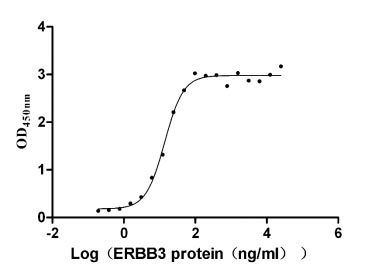
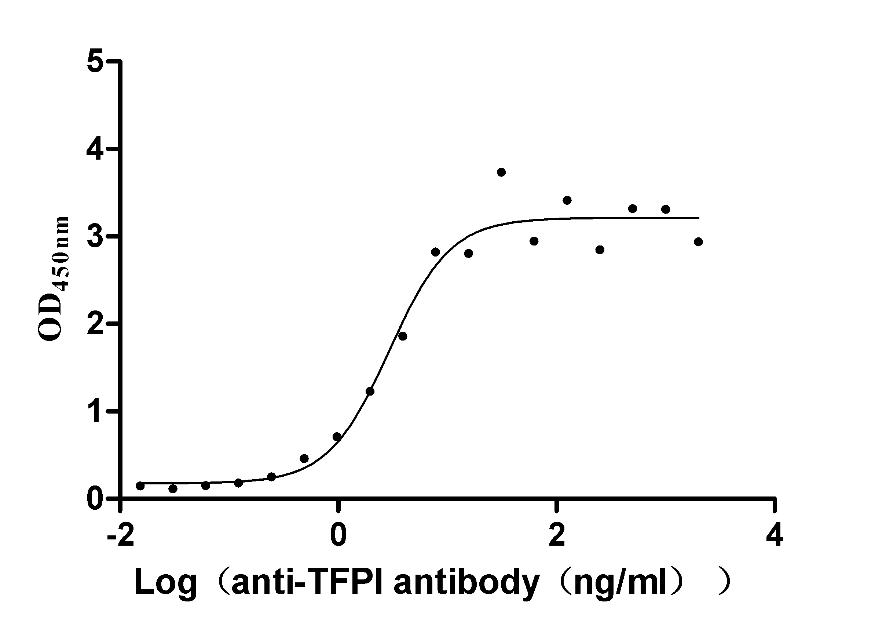
-AC1.jpg)

